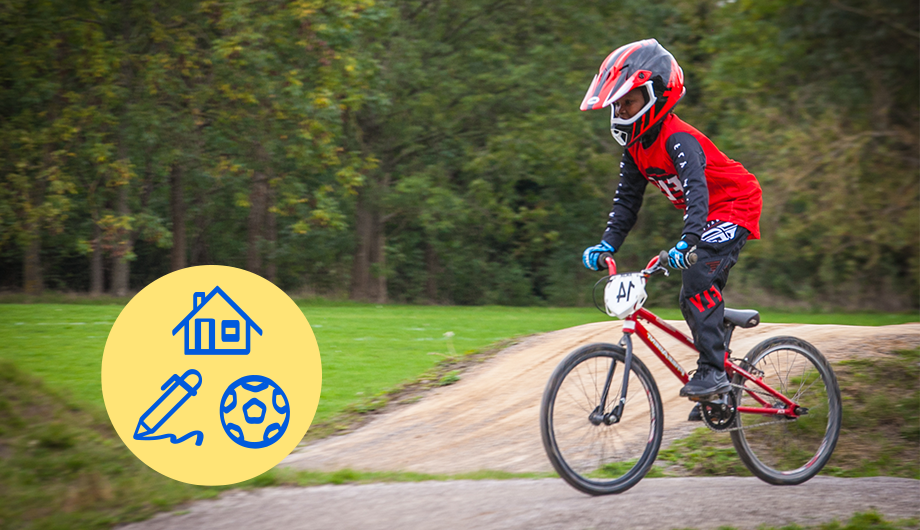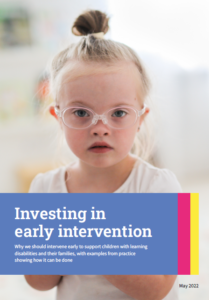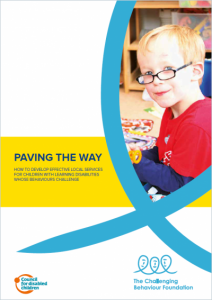
Housing, Education, Leisure
Our resources provide information about topics such as housing, education, relationships, going out and leisure time.

The CBF has produced various information resources showing how using early intervention methods, such as Positive Behaviour Support, can reduce the severity and frequency of challenging behaviour and improve quality of life.
All children who are at risk of presenting behavioural challenges have the right to have their needs identified at an early stage, leading to co-ordinated early intervention, support and education. NICE guidelines recommend that lead commissioners provide local services which can identify needs early and offer specialist prevention and early intervention support.

Many families of disabled children struggle to get the right early support in the right place at the right time – and this can mean that children’s and families’ difficulties get worse unnecessarily. This report highlights how and why we should intervene early with targeted support for children with learning disabilities and their families. The report was produced in collaboration with Cerebra, Mencap, University of Warwick and the Council for Disabled Children.
Find out more about the report
 Dr Heather Hanna & Siobhan Rogan describe the development of a service in Northern Ireland to enable children with learning disabilities to have equal access to child and adolescent mental health services. They set out that equal is not the same and describe how the service works. Outcomes include no admissions to inpatient care for more than five years which is significantly lower than the regional average.
Dr Heather Hanna & Siobhan Rogan describe the development of a service in Northern Ireland to enable children with learning disabilities to have equal access to child and adolescent mental health services. They set out that equal is not the same and describe how the service works. Outcomes include no admissions to inpatient care for more than five years which is significantly lower than the regional average.
The CBF took part in a collaborative project with the Institute of Health Visiting (iHV) to raise health visitors’ awareness of restrictive practices, how to challenge them and how to implement evidence-based alternatives. This included:
Find out more about this project
Early Positive Approaches to Support (E-PAtS) is a programme developed for families raising a young child with a learning disability or developmental disability. It was developed by the Tizard Centre with family carers, and with input from other key stakeholders including CBF.
The right support provided locally, at the right time, and delivered in partnership with families can deliver good outcomes and avoid the high costs of crisis intervention. The CBF led a three-year project on early intervention called Paving the Way. It found that evidence based early interventions, delivered locally can reduce behavioural problems and improve the wellbeing and quality of life of children and families, as well as avoiding the high costs of crisis support and services.
Read more about Paving the Way
 The Paving the Way report describes how to develop effective local services for children with learning disabilities and behaviours described as challenging. It includes examples of good practice, outcomes and costings, and advice on how to develop evidence-based local services.
The Paving the Way report describes how to develop effective local services for children with learning disabilities and behaviours described as challenging. It includes examples of good practice, outcomes and costings, and advice on how to develop evidence-based local services.
Download the Paving the Way report
Get a hard copy of Paving the Way
Children with learning disabilities who display behaviours that challenge often need support from across health, education and social care to live a rewarding and fulfilling life. The process for accessing support varies across England, Wales, Northern Ireland and Scotland. Learn more about gaining access to the right support from an early age here:
Getting support from education, health and social care

Our resources provide information about topics such as housing, education, relationships, going out and leisure time.

The Family Support Service can provide information and support about the needs of your family member with a severe learning disability. Our support is confidential, and we won’t judge you or tell you what to do.

This page and information sheet is for family carers of children and young people with severe learning disabilities whose behaviour challenges living in England, and explain the Special Educational Needs and Disabilities system.